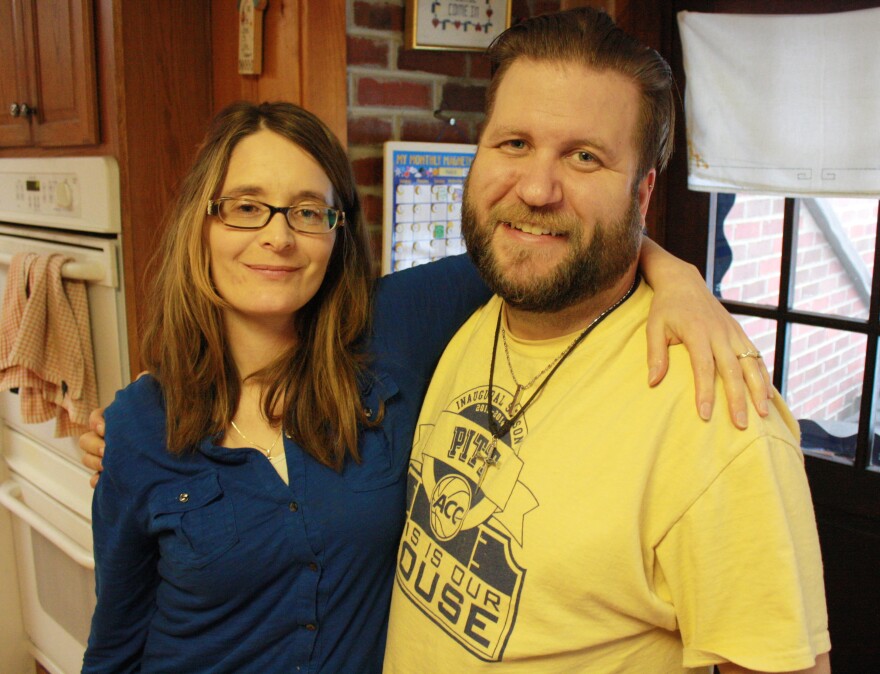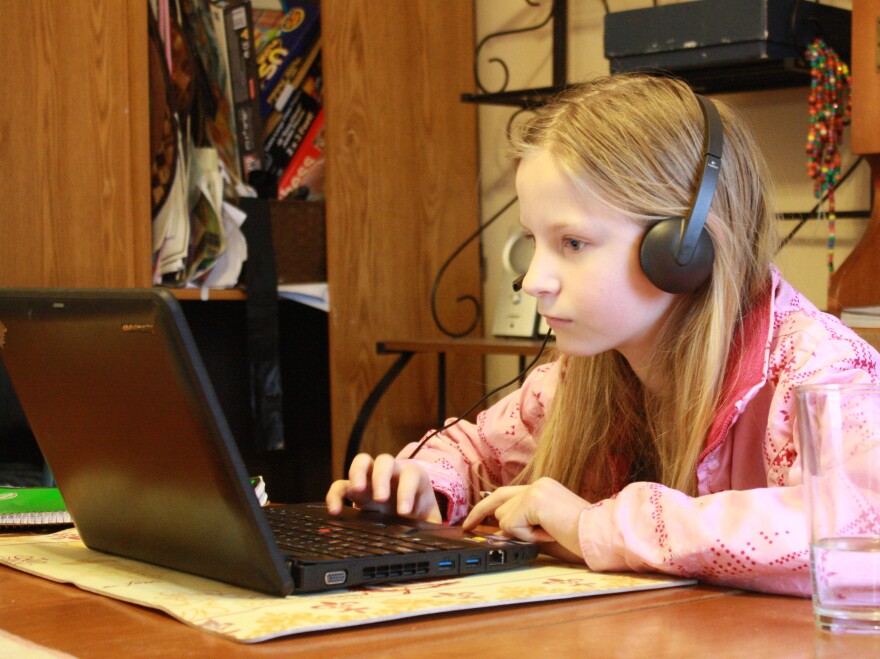For many, the mention of "homeschooling" conjures negative stereotypes about the people who practice it: Homeschool families are religious fundamentalists who shun secular society, or libertarian ideologues who reject the whole idea of public education on principle. Homeschool parents are conservative, controlling. Homeschool kids are sheltered, and suffer developmentally from a lack of socialization with their peer group.
A visit to the Squirrel Hill home of Beth and John Freeman easily dispels any such misconceptions. On a Tuesday afternoon, Beth Freeman is working with 5-year-old Karis, the youngest of the five Freeman kids. Karis’s older sister Kayla, 8, sits across the kitchen table studying language arts.
The environment is relaxed, and the kids seem to enjoy learning and being together. They’re friendly and outgoing – to all outward indications, very well-adjusted. The parents have no ideological quarrel with public education. Both attended public schools they remember fondly, and both went on to earn degrees at the University of Michigan, one of the nation’s most prestigious public universities.
For Beth Freeman, homeschooling is not political. She just wants to be directly involved in her children’s lives.
“Instead of my kid being away from me 30 hours a week, sometimes their best hours, with kids I don’t know, with principals and teachers I don’t know,” she said, “[homeschooling] just seemed like more of a natural step in the parenting and child-development process.”
Homeschool families are still very much in the minority, but their numbers are growing. As of 2012, federal data show the percentage of American students who are homeschooled has doubled since 1999, to 3.4 percent of all school-age kids.
The U.S. Department of Education keeps track of other statistics too, including the race, income and education level of parents who homeschool.
“Historically, it’s been primarily white,” said Vanderbilt University education professor Joseph Murphy, who studies the homeschooling movement and its history. “That’s been true over time.”
According to Murphy, the homeschool population is growing more racially diverse, attracting more Black families in particular. But white homeschoolers still outnumber their African American peers by a wide margin – much wider than the distribution in public schools, or in the population at large.
Economically, homeschool families overwhelmingly fall near the middle of the spectrum.
“On the high end, people are reluctant to stay home if they’re making a lot of money, so it’s easier to send your kid to a private school or a tutor, or whatever,” Murphy said. “And people at the bottom end of the income – that’s just not possible. You have to have both parents working a lot of times. So it really has been kind of the middle class adventure.”

The Freeman family fits this description pretty closely. They’re white and middle-class. Both parents are college-educated. Dad has a day job, and Mom stays home to teach.
Like many homeschool families, they’re also religious. John Freeman runs a Christian youth-outreach ministry for college students. But he thinks people tend to misconstrue the decision to homeschool as a “fundamentalist thing.”
“It’s not even a religious thing,” John Freeman said. “I think some people think, ‘Oh, you’re a pastor, it must be a religious thing,’ No, a lot of our friends who also homeschool are from varied, different religious background. And yet we can all agree on our educational philosophies.”
Murphy confirms that the homeschool movement includes families from every faith tradition and belief system, including non-religious ones. But mainline and evangelical Protestants are predominant. Catholic and Jewish families, he speculates, are underrepresented because both communities have their own, well-established systems of religious schools.
Blurred Boundaries
While researchers have sketched a basic socioeconomic profile of the homeschooling movement, the data can be fuzzy.
The reasons are twofold. For one, it’s an informal system, which makes it harder for researchers to gather information. Public schools, on the other hand, keep precise enrollment counts with detailed demographic breakdowns.

Secondly, changing technology and school reforms are making it more difficult to even define homeschooling as a category. A growing number of students are learning at home through privately run, publicly funded online schools. Those kids are not, technically, home-schooled: they’re cyber-charter students.
Meanwhile, many public school districts have begun offering their own online courses, and most already make printed materials and curricula available for home instruction. Students who use those resources don’t count either – even if they never set foot in a school building.
Under the formal definition of homeschooling, the government neither pays for — nor provides — instruction.
“Those are the two criteria,” Murphy said. “Once one of those becomes ‘yes,’ then it’s not technically homeschooling.”
When you plot it out that way, the Freemans are all over the map.
Their three youngest kids are all enrolled in PA Cyber Charter School, a privately run program that receives state funding. Five-year-old Karis is technically a cyber-charter student, even though she’s not quite ready to use a computer, and works mostly from printed materials.
The two middle-schoolers, Isaiah and Lydia, are also digital learners. But they’re enrolled in Pittsburgh Online Academy, a cyber school run by the city school district. That means they’re both students in Pittsburgh Public Schools.
“The benefit of Pittsburgh Online Academy is that they qualify for the Pittsburgh Promise, which is a great scholarship program,” Beth Freeman said.
The Freemans call themselves homeschoolers, and they fit the demographic profile almost exactly. None of their five children has ever attended a brick-and-mortar school. Yet, according to the rubric used by academic researchers and the federal government, none of them is actually homeschooled.
It’s one reason Murphy believes it’s likely that – when defined by the methods they use, and the movement with which they identify — homeschoolers are being under-counted.
“The line really can blur at that point,” Murphy said. “I think there’s a lot of people who are historically homeschooled that are not technically homeschooled... but in reality, are."
Why Homeschool?
When it comes to the question of who is homeschooling, the demographics will only get you so far. To understand who these families really are, you have to consider their motivations.
Statistically, homeschool families are more likely to be religious, and more likely to say that faith often plays a role in their decisions about schooling. However, research suggests it’s not the primary consideration for most.
According to the most recent data from the National Center for Education Statistics, the most frequently cited reason why parents choose to homeschool is “a concern about the environment of other schools.”
Increasingly, that means a concern about their children’s physical and emotional security.
“Whenever there’s a school shooting, I think there’s some of us parents who are like ‘Oh my God, that could my kid’s school,’” Beth Freeman said. “Or just things that go on in some schools…”
Things like bullying, sexual assault and peer pressure leading to bad choices.
“I think stories like that kind of scar moms and dads around the country, and they say, ‘Should I consider this?’” Freeman said.
In the 2012 NCES survey, 91 percent of parents said the school environment was an “important” factor in their decision, and a plurality said it was the “most important.” By contrast, only 16 percent opted to homeschool primarily because of a “desire to provide religious instruction.”
Once again, the Freemans are paradigmatic. They’re Christian, and they say their spiritual values are reflected in what they teach. But they’re not disturbed by the idea of their kids being exposed to secular teaching.
“I mean, the content we’re receiving now is from a government school,” Freeman said. “So it’s not like I need special content.”
More than anything, the Freemans say they want to spare their kids the pressure to perform well academically. They both felt it growing up, and they worry it’s getting worse as schools intensify their focus on standardized testing.
The Freeman kids take the state-required PSSA exams, and their mom thinks the tests can be a useful tool for measuring learning. But she doesn’t devote a lot of time to test preparation.
“I really just think if you don’t know it by now, what’s the point of cramming for the test? To measure you and make you feel better about yourself because you did better than somebody else?” Beth Freeman said. “I want you to learn it and know it, and enjoy it, and love learning. I tell my kids that a lot. I say, it’s not about the letter you get or the grade you get. I care about your attitude while you’re learning, and that you’re working hard.”
That’s becoming a widespread view these days. Many parents are choosing to “opt out” of testing their kids, and there’s been vehement opposition to the Common Core standards. It all ties in with a broader current in contemporary culture: a back-to-basics, do-it-yourself ethic that seems to inform everything from home-birthing to “locavore” culture.
“I think that, yeah, this age of ‘let’s figure out how to do things ourselves,’ and this kind of independent ingenuity, I think does foster it,” Beth Freeman said.
In a way, it’s a return to the movement’s roots. Contrary to its current image as a right-leaning enterprise, Vanderbilt professor Joseph Murphy says homeschooling began as a project of the postwar counterculture, when liberals grew distrustful of institutions — like schools — which they viewed as repressive and needlessly formal.
“The left made a really vigorous struggle in the ‘60s and ‘70s to reform schooling,” Murphy said. “But they didn’t win that battle, and they got frustrated. And they said, ‘look, if we’re not going to be able to change the public schools, we’re going to promote homeschooling as an alternative.’ They were the original seed.”
As a parent, Beth Freeman likes the freedom she gets from homeschooling. But she doesn’t want to turn her back on the system.
“I really want the educators in our country to be valued. They have studied learning systems, they’ve studied child development. We have very bright people who have given their careers to how to train a young mind,” she said. “What I would like is to be able to cooperate, and to tap into people who have the knowledge I don’t.”
The Freemans are pragmatic — you might even say agnostic — about the different methods available. They have no allegiances to any particular system, and they like to keep their options open.
“Each kid is so different, you know? You just see their personalities, the way they engage,” John Freeman said. “It’s kind of year-by-year, kid-by-kid.”
Next year, the Freemans are planning to send their two oldest kids to their neighborhood brick-and-mortar public high school: Pittsburgh Allderdice.





